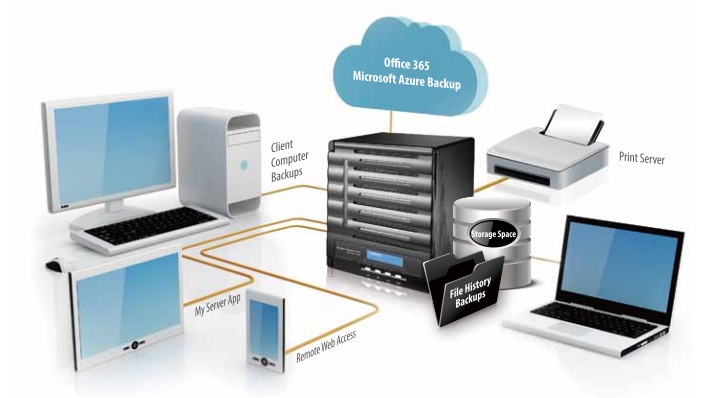
The U.S. Small Business Administration defines a small business as an enterprise employing fewer than 500 people. However, the vast majority of small businesses actually feature much smaller staffs, with non-employer businesses (self-employed) composing over 20 million of the roughly 28 million small businesses in the country. For these entrepreneurs, enterprise-level services are not appropriate.
As such, and in the interest of controlling costs, many small businesses have turned to cloud storage as the sole receptacle for their data. While cloud storage has its advantages, relying solely on this service puts small businesses at the mercy of certain unpleasant realities, such as costly monthly fees and the potential unavailability to business information if the data center should go down. A private NAS can help avoid these pitfalls while offering all of the services a small office or home office could need.
What is a NAS?
A NAS or network-attached storage is a data storage server that is connected to a computer network that is designed to serve files to the connected clients. More important, however, is that these machines are specially built for this task, utilizing specific hardware and software for maximum efficiency and efficacy. In almost every aspect, a NAS is another PC; it has a CPU, RAM, storage drives, an operating system and more. A NAS only really differs from a PC in its specialization.
The benefits of using a NAS over other local and offsite storage options include lower power consumption, small footprints and the ability to manage every aspect of data storage in-house. Users can expand their storage as they see fit, control up-time with additional measures like an uninterruptable power supply, and avoid the costly monthly fees that come with offsite storage.

Thecus Provides Easy-to-Use Cloud-Ready Storage Powered by Intel
Founded in 2004, Thecus has focused on building advanced but easy-to-use storage products that any user at any skill level can operate. Now they are targeting SOHO users with three new private NAS products: the W5000, W4000 and the W2000. Thecus’ goal is to bring affordable and reliable data storage that matches the needs of companies with staffs of 50 people or fewer.
Each of these products is powered by an Intel Dual Core Atom CPU, which features Intel Hyper-Threading technology as well as Intel HD Audio Technology. Coupled with 2GB DDR3 memory and these NAS solutions will have plenty of headroom for serving files. Each model features two gigabit LAN ports for speedy data transfer, and users will also appreciate the included HDMI and VGA multimedia ports for presenting files directly from the NAS. Connecting peripherals like portable drives is easy with several choices of USB 3.0, USB 2.0 and eSATA ports. The W2000 even comes with an integrated card reader, making it easy to migrate media from a capture device to the NAS. The biggest difference between Thecus’ offerings is the number of drive bays each NAS provides. Depending on business needs, users can choose from two-, four- or five-bay models, adding drives as time goes on to match their storage demands.
 Windows Storage Server 2012 Essentials On-board
Windows Storage Server 2012 Essentials On-board
Windows Storage Server 2012 Essentials offers a robust suite of services to give SOHO users the power they need to manage their data. These services include centralized management, data protection, remote access and more. Windows Storage Server also integrates with cloud services for backups, adding extra peace of mind.
One of the many hurdles that SOHO users face is the lack of a dedicated IT department. In these cases, it’s understandable why so many users opt for a third-party to manage their data. Windows Storage Server eliminates that hurdle with an easy-to-use interface that makes controlling how the NAS works on the server a simple task. Share printers on a network and centralize printer management tasks. Stay up to date on server problems, like low space or issues related to backups. Users can also manage user groups to ensure that the correct people have the correct access rights. All of this is controlled with one simple interface.
For users in this segment of small businesses, the workday will usually continue outside of the office. Windows Storage Server accommodates those needs with Remote Web Access. RWA offers a secure way to access files, folders and client computers from a web browser on almost any device. Touch users will enjoy the My Server App which offers a touch-friendly interface for accessing data. Lastly, virtual private networking is provided so that users can remotely access the Windows Storage Server environment wherever they are.
Finally, users will enjoy all of the data protection services that Windows Storage Server offers. Ensure that essential files aren’t accidentally overwritten with the convenient File History feature that allows older versions of files to be recovered. Users can also backup their client computers that are attached to the network, making it easy to restore lost data or an entire machine if necessary. The server itself can be backed up either internally or externally as another form of redundancy. Finally, Windows Storage Server also integrates with Microsoft Azure Backup which ensures that your business-critical data is stored securely on the cloud in an offsite data center.
What Will You Achieve With Your Private NAS?
All of these features and more are available on the new line of NAS solutions from Thecus. Check out the W5000, W4000 and the W2000 today and see how you can integrate them into your SOHO.
If you are you a small business owner, either self-employed or with a small staff, we would love to know how a private NAS would help you with your business goals. Let us know in the comments below!

